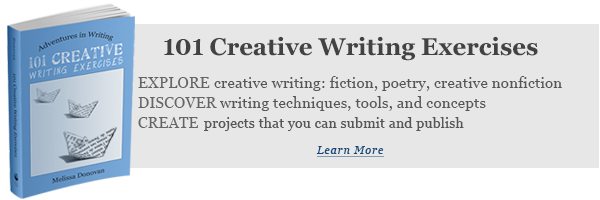Today’s post is from 101 Creative Writing Exercises. This exercise is from “Chapter 9: Philosophy, Critical Thinking, and Problem Solving.” It’s called “The Great Debate.” Enjoy!
Logic, order, and organization are essential in clear and coherent writing, whether you’re telling a story or writing a poem. Critical thinking is a fundamental writing skill.
If a story doesn’t stand up to logic, or if a poem has holes in its philosophy, readers will become disenchanted. If a character does something outrageous but doesn’t have a reasonable motive, readers will become disengaged.
Writing requires foresight and analysis. We use what-if questions to create, and we use if-then arguments to substantiate everything we write.
We often think of arguments as conflicts, and most arguments are. A neighbor doesn’t want to chip in for a fence that divides two properties, and an argument ensues. A spouse comes home late after forgetting to call. An argument ensues. A child comes home with a bad grade. Another argument.
Argument does not always stem from personal conflict. The greatest debates throughout history have dealt with philosophical issues—questions to which there are no absolute answers. While our characters will surely experience personal arguments, it is our mastery of the philosophical arguments that will make a narrative reasonable and believable.
The Exercise
First, you’ll need to pick an issue or philosophical question (suggestions are provided below). Write a piece of dialogue between two speakers in which they engage in a debate, with each taking an opposing side in the argument. Write it as a simple script. Here are some topics to get you started:
- One speaker believes in a supreme being or higher power, and the other does not.
- Fate or free will? One believes in destiny, the other believes that life’s outcome is strictly the result of choice and circumstance.
- Do good and evil exist? One believes good and evil are struggling to eradicate each other. Another argues that good and evil are relative, subjective, or mere human imaginings.
- Are morals and ethics circumstantial or static? One believes it’s always wrong to kill another person, no matter the circumstance. The other believes in the death penalty or self-defense.
- One speaker believes in life after death, and the other believes it all just ends.
Another source of ideas for philosophical debates is political issues.
Tips: This exercise will work best if you pick an issue with which you’re familiar but on the fence. For example, perhaps you know a lot about the death penalty but haven’t taken a stance on it. Since you are not on either side, you will probably do a good job arguing for both sides. However, if you want to choose an issue that you feel strongly about, you should do your best to convey the opposing arguments in a convincing manner. You can also research any of these issues to get some ideas about positions on the matter.
Variations: As an alternative, you can write two short essays (one page each) for and against the issue you have chosen. You can also engage a friend to write an opposing viewpoint.
For an extra challenge, find a friend who truly disagrees with you on an issue, and write each other’s arguments. See if you can present the other side’s best positions and ideas, and then critique each other’s papers.
Applications: You might have two characters in a story who have basic philosophical differences. Such opposition could split a tribe, end unity in a nation, or break up a relationship. Philosophical issues often arise as themes in storytelling, poetry, and journalism.





